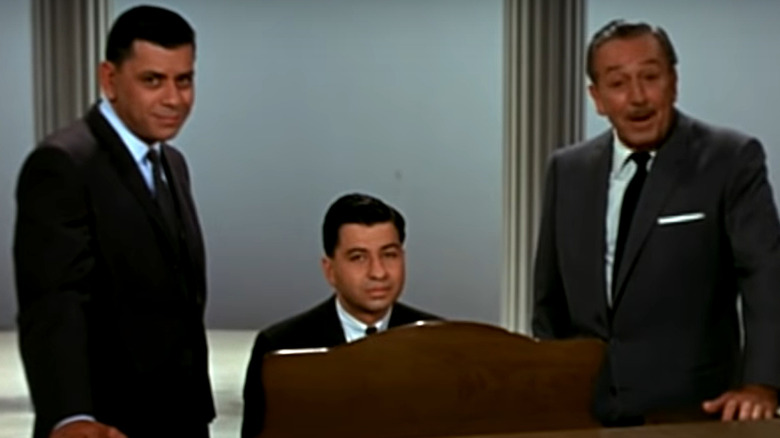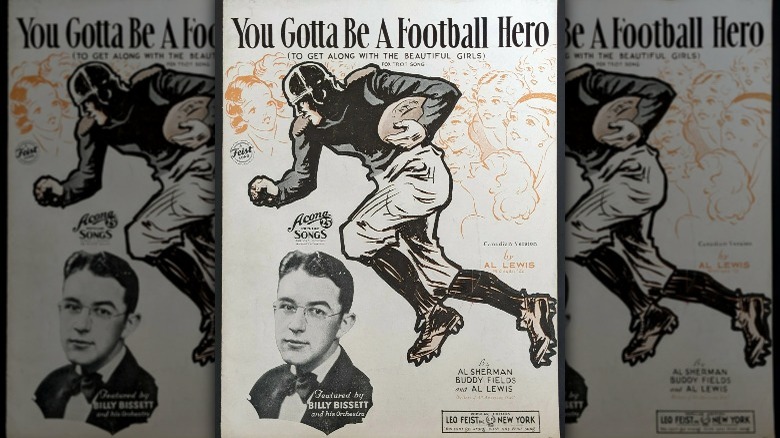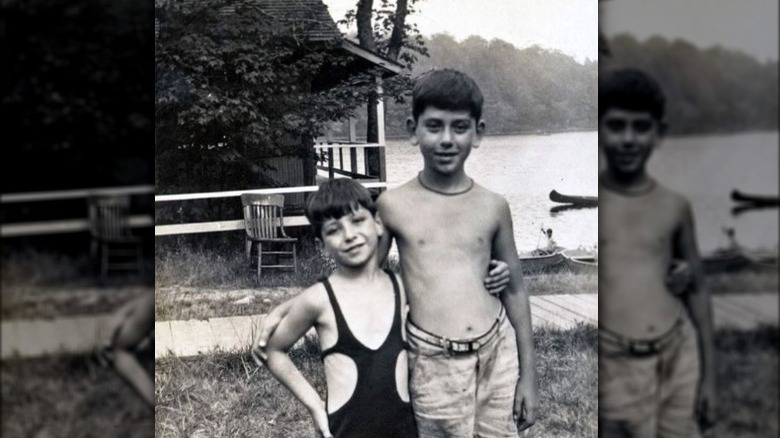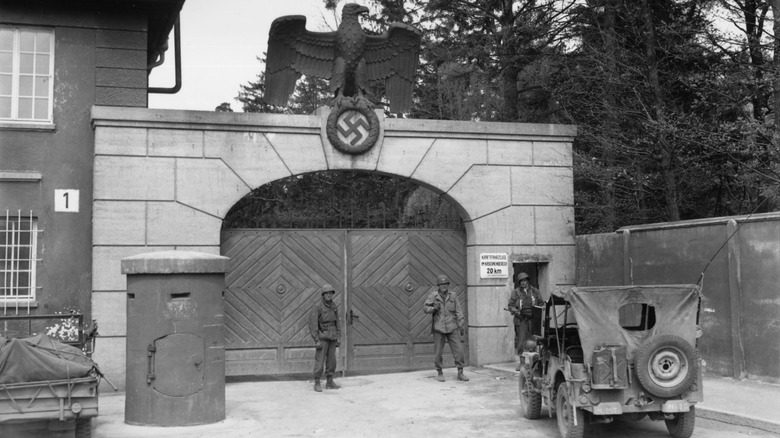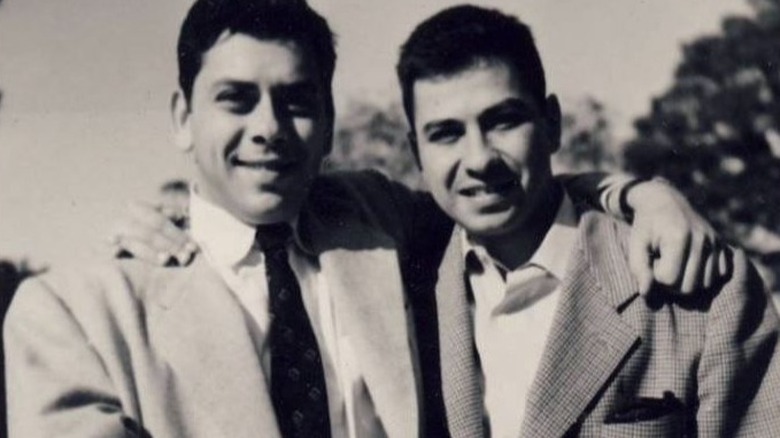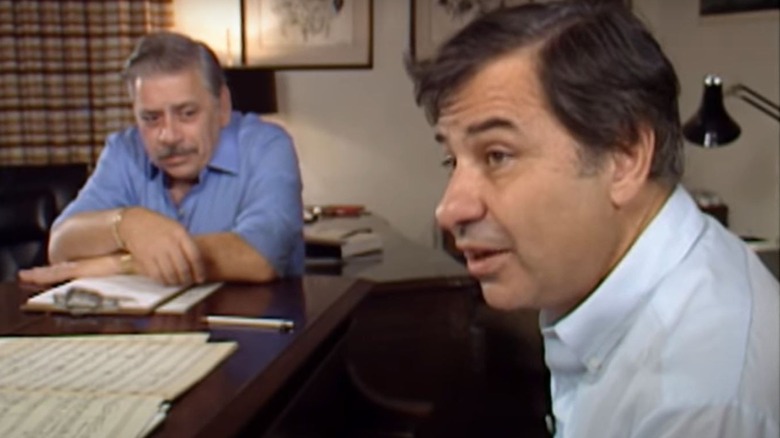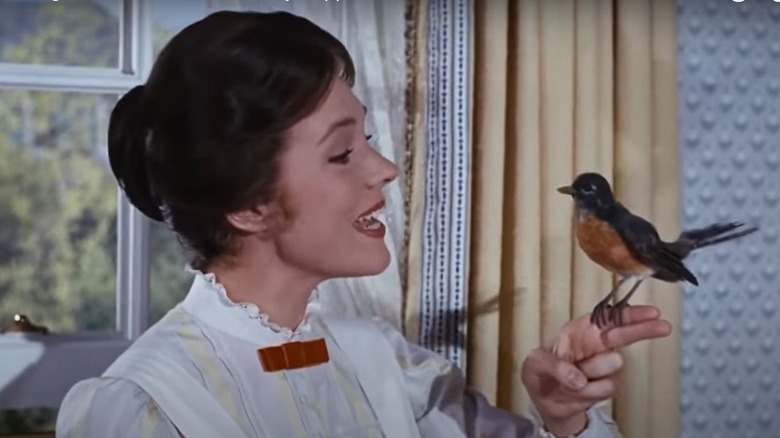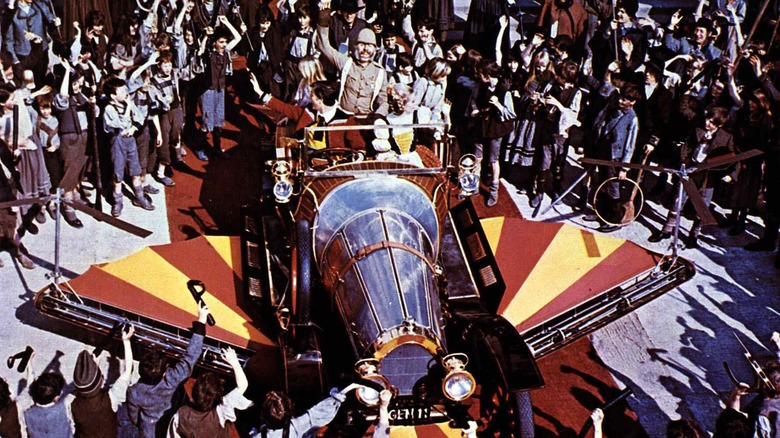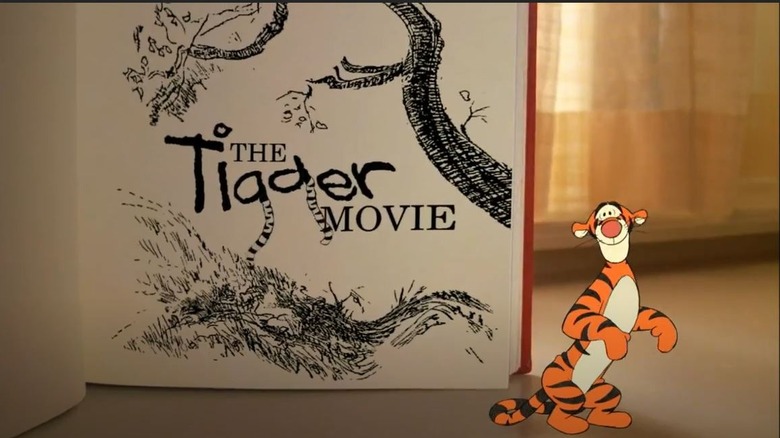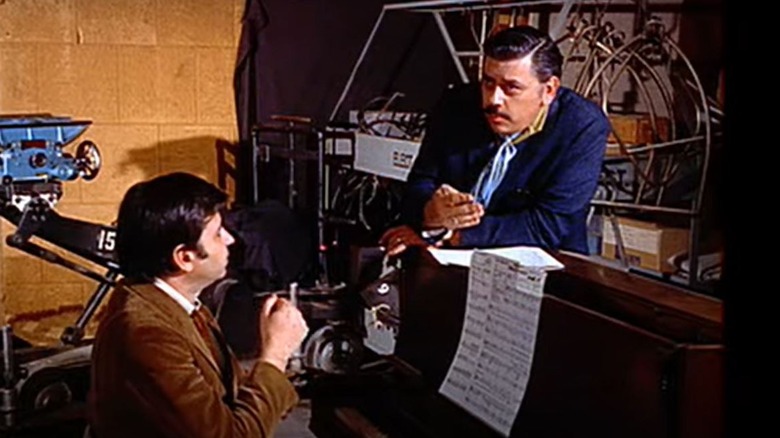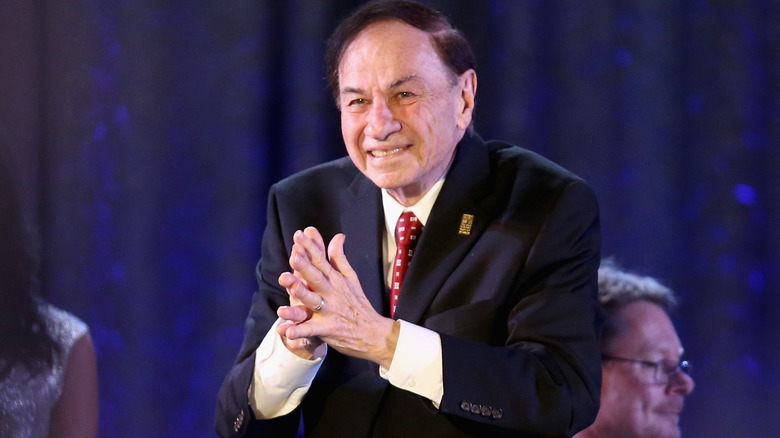The Untold Truth Of The Sherman Brothers
When you think of Disney, chances are you think of music. Admit it, you're humming a song right now. Maybe it's "Supercalifragilisticexpialidocious" from "Mary Poppins." Or if you're more into their animated films, perhaps it's "I Wanna Be Like You" from "The Jungle Book." Or if you're a theme park aficionado, maybe you have history's greatest earworm stuck in your mind courtesy of "It's a Small World." Whatever the case, the song in your head right now was probably written by Walt Disney's secret weapons: Robert and Richard Sherman.
They called each other Bob and Dick, but they were better known to the world as The Sherman Brothers. And for decades, they defined that classic Disney sound. But while the Sherman Brothers were the public face of whimsy with their lighthearted and joyful tunes, behind the scenes things weren't always so cheerful. Robert Sherman, who passed away in 2012 at the age of 86, as per the Los Angeles Times, struggled with mental health issues, from wounds both physical and psychological that he suffered while fighting in World War II. And Richard Sherman, who continues to make music even today, battled his own demons — and sometimes, his older brother.
So grab your spoonful of sugar. Because you may need it to help the untold truth of the Sherman Brothers go down.
The Sherman Brothers weren't the first famous songwriters in the family
The Sherman Brothers may now be one of the most famous and beloved songwriting teams of all time, but at one time they weren't even the most famous songwriters in their own immediate family.
As the Songwriters Hall of Fame notes, their father Al Sherman wrote hit after hit for stage and screen at the same time that Walt Disney was producing his first hit cartoons in the 1920s and '30s. Disney wasn't the only popular cartoon maker around, though, as Al Sherman's song "You Gotta Be a Football Hero" inspired a popular Popeye cartoon in 1935 (via the Library of Congress).
But it was another song that became his legacy. When he died in 1973, an AP obituary that ran in the New York Times noted his most famous tune, "Potatoes are Cheaper, written during the Depression. All in all, he wrote more than 500 songs.
Even after his death, his work continued to resonate. In 1983, Cyndi Lauper covered his song "He's So Unusual," tweaking the lyrics for what became the title track of her seminal breakthrough album "She's so Unusual," which was preserved by the library of Congress. Still, for all that, some consider his greatest legacy to be his sons — which is ironic considering they may have unintentionally sabotaged his career.
Richard Sherman was a sick and troubled child
Just when it seemed like Al Sherman was destined for even greater fame and fortune, fate intervened when his youngest child, Richard Sherman, was diagnosed with vasomotor rhinitis, as per Robert Sherman's autobiography, "Moose: Chapters From My Life." According to the Asthma + Respiratory Foundation, symptoms of the chronic breathing condition can resemble hay fever attacks, except they can potentially be triggered by any slight change in air quality. This can make it potentially difficult to treat, especially given the medical standards of the 1920s and '30s.
Told by doctors that a more temperate climate would help the sickly child, Al Sherman bounced the family back and forth between New York and California for many years in an effort to juggle work and family needs. Eventually the family moved permanently to Beverly Hills in 1937, as per The Guardian, when Richard was still a boy. Older brother Robert Sherman wrote in his autobiography, "Moose: Chapters From My Life," that he believed his father harbored resentment against Richard for damaging his career by forcing the move away from New York.
According to Robert, his younger brother Richard in turn harbored a deep guilt and became sullen, often acting out. It finally came to a head when Richard actually set fire to his elementary school classroom; his parents ended up putting Richard into military school to avoid going to jail.
It wouldn't be the Sherman Brothers' last experience with the military, though.
Robert Sherman liberated Dachau concentration camp during WWII
When you think of the Sherman Brothers songs, magic and whimsy are the first things that come to mind. So it's tragically ironic that Robert Sherman actually experienced first hand one of the most horrific events in human history: the Holocaust.
When America entered World War II following the attack on Pearl Harbor in 1941, Robert Sherman was determined to do his part even though he was still in high school. So he wrote a play about Pearl Harbor; performances raised thousands of dollars for the war effort, earning Robert a commendation from the government, as per his autobiography, "Moose."
But that wasn't enough. At just 17 years old, Robert convinced his parents to allow him to enlist in the Army, and shortly thereafter participated in the Allied invasion of Europe. In April of 1945, while leading a patrol in southern Germany, Robert stumbled across a group of German soldiers fleeing from a strange complex, he details in his autobiography. After they left, he discovered the awful truth: He was among the first American soldiers to enter the concentration camp known as Dachau (per the Los Angeles Times).
Four days later, during a firefight with German troops, Robert was shot in the knee and ultimately walked with a cane for the rest of his life. But the worst scars weren't physical, they were mental. In his autobiography "Moose," Robert said of Dachau, "In a half hour I saw enough to fill my nightmares for the rest of my life."
Robert Sherman's therapist predicted he would be dead by 30
Many of the songs in the Sherman Brothers discography contain a touch of sadness. To borrow a line from "Chim Chim Cher-ee," their music exists half in shadow and halfway in light. Which makes sense when you understand Robert Sherman's struggles with depression and bipolar disorder. Following his return from the war, he attended Bard College. But Robert's terrible experiences in the war marked him. He sought help, beginning therapy sessions with his psychology professor, Dr. Werner Wolf, an early proponent of existential psychotherapy.
Robert later wrote in his autobiography "Moose" that though he found the sessions useful, Wolf wasn't convinced they would help. "He came to predict that my bouts of depression would see me dead before my thirtieth birthday." Robert was also diagnosed with bipolar disorder and later realized his disorder was exacerbated by seasonal triggers caused by the constant uprooting he experienced as a child. He wrote in "Moose" that he would "become completely psychotic" in September, something that startled his newlywed wife Joyce after they married in 1953.
"Sometimes Joyce would discover me crying bitterly in the bathroom with the shower running. Especially during September I would do strange things like hoard newspapers and magazines under the bed. ... But then, after each black month, I resumed being my normally manic-depressive self which was at least more predictable."
Luckily, by then he had found a new outlet: writing songs with his brother. Richard Sherman.
If you or anyone you know is having suicidal thoughts, please call the National Suicide Prevention Lifeline at 1-800-273-TALK (8255).
They started writing songs together on a bet
Given that their father was a famous songwriter, it would be easy to assume that the Sherman Brothers were destined to become famous songwriters too. But originally, it wasn't something either wanted to do.
Robert Sherman wanted to be a writer, while Richard Sherman aspired to be a classical composer, reports CBS Sunday Morning. But neither of them seemed to be getting anywhere — until, in 1951, their father challenged them with a bet. Richard said, "'I bet you couldn't team up together and write a song that some kid would give up his lunch money to buy a record of it.' He said, 'yeah, I don't think you have enough brains to do that.' And then he turned around and left."
The Sherman Brothers set out to prove him wrong. The result, as Richard told Scott Feinberg, was a song called "Gold Can Buy You Anything (But Love)." Not only did they sell it, but the song was recorded by country superstar Gene Autry. It looked like they were about to hit it big, but before the song had a chance to make the charts, Autry decided to promote a different song instead.
Just like that, their dreams of a hit were snatched away. It would be eight more years before they finally had a Top 10 hit when Mousketeer Annette Funicello recorded "Tall Paul" — bringing them to the attention of Walt Disney.
The classic song It's a Small World was never supposed to exist
Everybody knows "It's a Small World": Dozens of cherubic little dolls, spinning and clacking their little animatronic eyelids, all singing that loved and loathed song, over and over again, for all eternity. As Time notes in 2014, Nigel Harrison's 1998 book, "Songwriters: A Biographical Dictionary with Discography," claims the song has been the most performed in the entire world, with Time estimating that it had been performed roughly 50 million times. And the funny thing is, the song was never supposed to exist at all.
When Walt Disney was preparing the attraction that would eventually be called "It's a Small World" for the 1964-1965 New York World's Fair, the original idea was to have all the children of the world singing their own national anthems at the same time. The result was an ear-piercing cacophony. Richard Sherman told interviewer Scott Feinberg, "On paper, it's brilliant. In actuality, it's horrendous. Just horrible. It won't work."
So Disney brought in the brothers to try and come up with a solution. Their brainstorm: "It's a Small World." Disney knew immediately that the song would be a hit. Not only did he change the name of the ride, when the Sherman Brothers suggested they should donate their royalties from the song to UNICEF, he was adamant they do no such thing, telling them, "You are not going to give away your birthright. This is going to send your kids through college."
The most magical Sherman Brothers songs came from their worst working experience
The Sherman Brothers are most famous for the beloved songs they wrote for the 1964 smash hit "Mary Poppins." "A Spoonful of Sugar," "Feed the Birds," "Supercalifragilisticexpialidocious," and "Let's Go Fly a Kite" are just some of the film's classic tunes. The Sherman Brothers won two Oscars for the film: Best Original Score for the movie and Best Song for "Chim Chim Cher-ee." So it's a bit ironic that their best work came from their worst working experience.
The 2013 film "Saving Mr. Banks" detailed how "Mary Poppins" author P.L. Travers was deeply unhappy with the Disney adaptation of her book. And she was especially disdainful of the songs written by the Sherman Brothers. She spent two weeks working with them on the movie, and according to the Sherman Brothers, it was anything but supercalifragilisticexpialidocious. Richard told The New York Times, "She didn't care about our feelings, how she chopped us apart."
Ultimately, of course, "Mary Poppins" became a beloved classic. But Richard told Variety that even decades later, the experience of working with Travers still leaves a bad taste in his mouth. "Mrs. Travers was very difficult. ... I never had such trouble. It was a joy to work on after we finally got the rights. It was a dream cast. But those two weeks I would hate to go through again."
They received more acclaim after leaving Disney than with Disney
The Sherman Brothers are beloved the world over thanks to their work at Disney. But it may surprise you to learn that they actually received even more acclaim for their work outside of Disney than for Disney.
As the Society of Composers and Lyricists details, starting with 1968's "Chitty Chitty Bang Bang," the Sherman Brothers spent the next decade making hit after hit outside the Disney system with projects like "Tom Sawyer," "Snoopy Come Home," and "The Slipper and the Rose," while their 1974 Broadway musical "Over Here!" was nominated for five Tony awards, per Playbill. Heck, they even became the only Americans to ever win at the Moscow Film Festival, as per the Society of Composers and Lyricists.
But success came at a cost. Robert Sherman revealed in his autobiography, "Moose," that his physical and mental health spiraled. In 1973, at the height of their success, he needed knee replacement surgery to avoid having his leg amputated. Then, he had to be treated for codeine addiction. But coming off the drug caused his bipolar disorder to spin out of control. He wrote, "I continued to experience ever worsening mood swings. Things came to a head in 1976 when I suffered an emotional collapse and nervous breakdown."
Luckily, he found a psychiatrist who helped him get back on track. But not before The Sherman Brothers' career came crashing down.
If you or anyone you know is struggling with addiction issues, help is available. Visit the Substance Abuse and Mental Health Services Administration website or contact SAMHSA's National Helpline at 1-800-662-HELP (4357).
After they hit bottom, Tigger saved them
As he details in his autobiography, "Moose," following Robert Sherman's nervous breakdown, the Sherman Brothers struggled to get high profile movie gigs, especially as '80s Hollywood turned away from musicals to embrace action movies. So for nearly two decades, the Sherman Brothers scraped by, including working on weird projects like the Cabbage Patch Kids album "Cabbage Patch Dreams." It wasn't until 1995 that they seemed to finally get their ticket back to the big time when their musical "Busker Alley" was set to arrive on Broadway, headlined by Tommy Tune.
It never happened, though. After Tune broke his foot (via the New York Times), the project was put to a halt. Robert Sherman wrote in his autobiography that he nearly quit. "That year I would turn 70. I thought that perhaps it was time to pack up shop. ... it felt as if our careers were slowing to their natural conclusion."
But then everything changed thanks once again to the big boss at Disney. But this time it wasn't Walt Disney. It was Michael Eisner. After contributing a song to the 1999 direct-to-video release "Winnie the Pooh: Seasons of Giving," the Sherman Brothers were hired to write songs for the next direct-to-video release, "The Tigger Movie." But when Eisner saw an early screening, he loved the songs so much he insisted it get a theatrical release.
Suddenly the Shermans were in demand again, and the 2000's would prove to be their biggest decade yet.
The Sherman Brothers secretly had a difficult personal relationship
After decades out of the spotlight, the Sherman Brothers were suddenly and unexpectedly everywhere in the 2000s. In 2002, the stage musical adaptation of "Chitty Chitty Bang Bang" premiered in London, as per Robert Sherman's autobiography, "Moose." Featuring six new songs by the Sherman Brothers, it made it to Broadway in 2005, earning five Tony nominations per Broadwayworld.com. It was followed in 2007 by a musical adaptation of "Mary Poppins," which garnered seven Tony nominations, including Best Musical, according to Theater Mania.
To top it off, they were elected to the Songwriters Hall of Fame and received the National Medal of Arts from President George W. Bush. It seemed they were more popular than ever. Except with each other. In their review of the 2009 feature documentary, "The Boys: The Sherman Brothers Story," The Toronto Star discussed that their appearance of brotherly love was a facade, and outside of their public image, they lived very separate lives.
However, according to Robert Sherman's autobiography, "Moose," the feud was mostly reality TV spin.
The Sherman Brothers' secret MCU connection
After a partnership that lasted an entire lifetime, the Sherman Brothers finally stopped working together only in 2012 when Robert Sherman sadly passed away at the age of 86, as per The New York Times. But Richard Sherman continues to write songs today. Now in his 90s, Richard's work has even introduced the music of the Sherman Brothers to a whole new audience thanks to a part of Disney that Walt Disney could never have imagined: the MCU.
In Marvel's 2010 hit, "Iron Man 2," the character of Howard Stark bore a strong resemblance to Walt Disney. In particular, the flashback scene where Stark introduces his plans for Stark Expo 1974 was reminiscent of Disney's famous unveiling of his plans for EPCOT. So who better to do the Stark Expo theme song than Richard Sherman, who of course had done the "It's a Small World" theme for Walt Disney for the 1964 New York World's Fair?
The result was "Make Way for Tomorrow Today." Though it was co-written by John Debny, the tune has that classic Sherman Brothers sound to it. And Marvel liked it so much that they have brought it back multiple times, playing it in the Stark Expo 1943 scene in "Captain America: The First Avenger" and again in "Avengers: Endgame."
